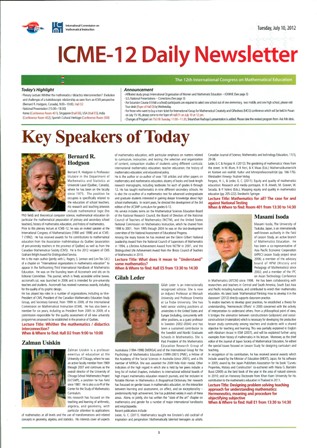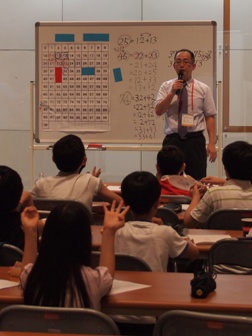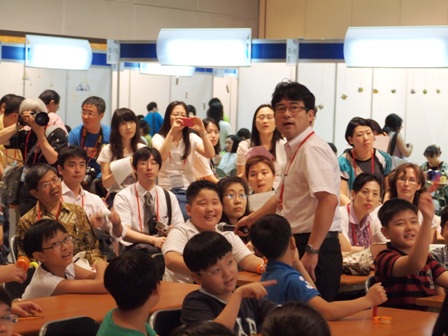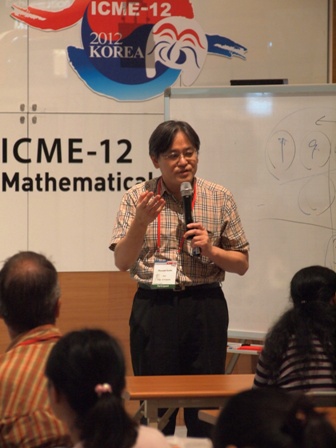Abstract
During the past ten years, lesson study has been spreading for the improvement of classroom practices from the USA to other countries. Originated from Japan a hundred years ago, it is beginning to influence many countries and has been exercised to develop innovative approaches in each country.
On this context, the Asia-Pacific Economic Cooperation (APEC) has adopted the Lesson Study Project for
Mathematics from 2006. This presentation includes a Lecture Session for introducing what lesson study is and what has been going on in APEC economies, and Demonstration Sessions for experiencing lesson study in English. Lessons present the problem solving approaches by Japanese expert teachers with Korean elementary school students.
Programs
- Exhibition
- Lecture
- Workshop
- Lesson Study
I. Regular Lecture
TIME, July, Room
Slot II, Tuesday, July 10, 13:30-14:30
RLII-6 Hall E1 Designing problem solving teaching approach for understanding
mathematics: Hermeneutics, meaning and procedure for objectifying subjective
Masami Isoda |
 |
II. Math Plaza Workshop

July 10, Tue
- 15:00-16:00: Enjoy Mathematics at Elementary School
-
- Coordinated by Hiroshi Tanaka, Satoshi Natsusaka, Toshiyuki Nakata and Kei Ohno (University of Tsukuba)
- Participants learn Japanese problem solving approach with enjoyable experience. The coordinators have been leading lesson study in the world.
- 17:00-18:30: Let's Read Japanese Elementary School Textbook: It's Amazing for Problem Solving Approach.
-
- Coordinated by Masami Isoda, Hiroshi Tanaka, Satoshi Natsusaka, Toshiyuki Nakata and Kei Ohno (University of Tsukuba)
- Participants enjoy to analyze Japanese Elementary School textbooks which have English and Spanish Edition and know how it is well structured to develop children's mathematical thinking. And then, learn the theory of curriculum for elementary school.
July 11 Wed
- 12:00-13:00: How to develop good practice through Lesson Study.
-
- Coordinated by Hiroshi Tanaka, Satoshi Natsusaka, Toshiyuki Nakata and Kei Ohno (University of Tsukuba)
- Participants learn the various technique for developing children who learn mathematics by themselves. The coordinators have been leading lesson study in the world.
- 17:00-18:30: Let's Enjoy Japanese Abacus/Soroban!
-
- Coordinated by Koji Suzuki and Satoru Akiyama, Mathematics Education Society of Japan.
- Participants learn how to use Japanese Abacus and know technique and mind in East Asian Mathematics. The coordinators have been working in the world.
July 13 Fri
- 10:30-11:30: How to conduct the lesson study: An authentic method to produce Enjoyable Math Class.
-
- Coordinated by Yasuhiro Hosomizu, Yoshikazu Yamamoto, Takao Seiyama and Masami Isoda (University of Tsukuba)
- Participants learn the authentic method of Japanese lesson study through enjoyable activity at elementary school level. The coordinators have been leading lesson study in the world.
- 12:30-13:30: Let's Experience the Lesson Study! (Demonstration by the Real Classroom)
-
- Topic: Let's Explore the Number Table for Grade 5 Children
- Lesson Presenter: Yoshikazu Yamamoto, Elementary School at the University of Tsukuba, Japan.
- Participants participate lesson study program: Especially observation part and commentary part. Participants learn the way to share the objective of the class which is necessary to share the experience for its improvement.
- 16:00-17:00: How to Develop Mathematical Thinking in Classroom
-
- Coordinated by Masami Isoda, Yasuhiro Hosomizu, Yoshikazu Yamamoto and Takao Seiyama (University of Tsukuba)
- Participants learn the practical theory for developing mathematical thinking as the product of lesson study during 50 years and enjoy how to extend mathematics by themselves.
- 17:00-18:30: Origamics 1: Let's Enjoy Paper Folding!
-
- Coordinated by Kazuo Haga, Masami Isoda (University of Tsukuba) and Ivan Vysotsky (Moscow Institute of Open Education)
- Participants enjoy Origami through developing solid and learn how to explore mathematics. Origami has been explored mathematically more than 100 years. ORIGAMICS is originated by Dr.Haga. It is known in the various language edition including Russia.
July 14, Sat
- 15:00-16:00: How to develop and use e-textbook with the freeware dbook?
-
- Coordinated by Masami Isoda (University of Tsukuba), Devadason R. Peter
(SEAMEO-RECSAM) and Maitree Inprasitha (Khon Kaen University)
- Participants learn how to develop e-textbook and know how to use it with the example of elementary school classroom and high school classroom. Please search by the key words; Schooten, dbook and e-textbook. dbook is the world famous freeware to develop e-textbook immediately and easily.
- 16:30-18:30: Origamics 2: Let's Enjoy Paper Folding!
-
- Coordinated by Kazuo Haga, Masami Isoda (University of Tsukuba) and Ivan Vysotsky (Moscow Institute of Open Education)
III. Lesson Study Set
Lesson Study set






s.jpg) [1]
[1]
s.jpg) [2]
[2]
s.jpg) [3]
[3]
s.jpg) [4]
[4]
s.jpg) [5]
[5]
s.jpg) [6]
[6]
s.jpg) [7]
[7]
s.jpg) [8]
[8]
s.jpg) [9]
[9]
s.jpg) [10]
[10]
s.jpg) [11]
[11]
s.jpg) [12]
[12]
s.jpg) [13]
[13]
s.jpg) [1]
[1]
s.jpg) [2]
[2]
s.jpg) [3]
[3]
s.jpg) [4]
[4]
s.jpg) [1]
[1]
s.jpg) [2]
[2]
s.jpg) [3]
[3]
s.jpg) [4]
[4]
s.jpg) [5]
[5]
s.jpg) [6]
[6]
s.jpg) [7]
[7]
s.jpg) [8]
[8]
s.jpg) [9]
[9]
s.JPG) [1]
[1]
s.JPG) [2]
[2]
s.JPG) [3]
[3]
s.JPG) [4]
[4]
s.JPG) [5]
[5]
s.JPG) [6]
[6]

